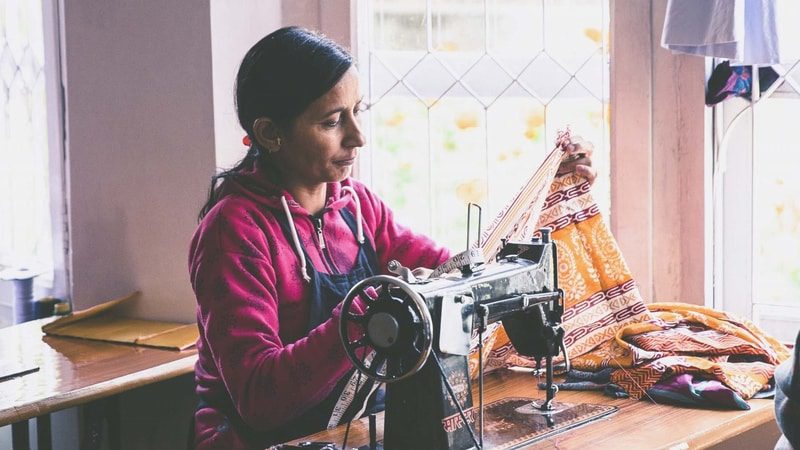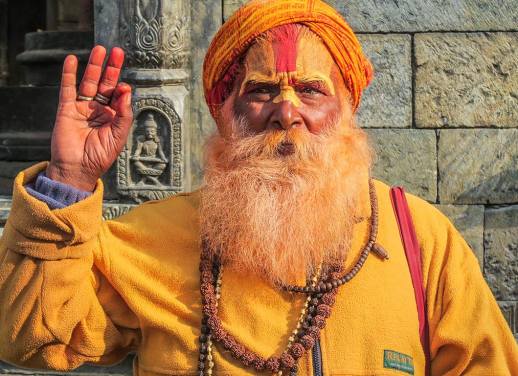In a place where ‘choice’ for many women is defined as either marrying young or being sold to a man in India, this Nepali social enterprise is helping young women demand more.
This article was originally published on Adventure.com
The air is heavy with clove and cardamom, a sure sign that sweet masala tea is on the boil. To my left, ginger is being ground to dust by a five-foot Nepali woman and to my right, a single pot, on an impeccably clean stove top, looks dangerously close to overflowing.
“Quick! Quick! It’s growing as tall as Mount Everest!” an aproned lady cries as she shoves a wooden spoon in my hand, motioning for me to stir the pot’s contents. Inside is a mountain of bubbling rice pudding: A literal melting pot of thick coconut milk, basmati grains and lashings of love. You see, I’m at the Seven Women centre, an NGO based out of Kathmandu, where women’s empowerment is served hot, delicious, and for everyone to share.
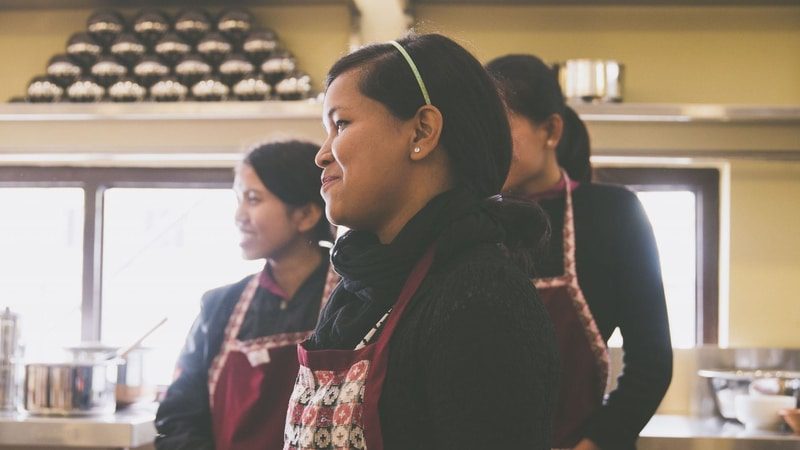
I’m welcomed by Amrita, one of the centre’s employees. Amrita has a smile so wide it could rival the Grand Canyon (or the Thokla Pass, if we want to keep our similes local). She ushers me through the wrought iron gates and into the heart of the home where I’m met by the whirr of five ancient Singer sewing machines and laughter from the saree-clad women seated behind them.
What these women have in common, aside from a penchant for patterns, is a life formerly dictated by disadvantage. In Nepal, the education of women is not traditionally a top priority. In rural regions especially, women are unlikely to be taught to read, write or manage money.
Since its inception in 2006, Seven Women—which has been supported by The Intrepid Foundation since 2015—has been a safe harbour for Nepali women of all class and caste. Over 5,000 ladies have benefited from their literacy classes, skills training and income generation programs, held both in Kathmandu city and across local village communities. What began as a grassroots project to help women facing discrimination due to disability has grown into a fully-fledged philanthropic success.
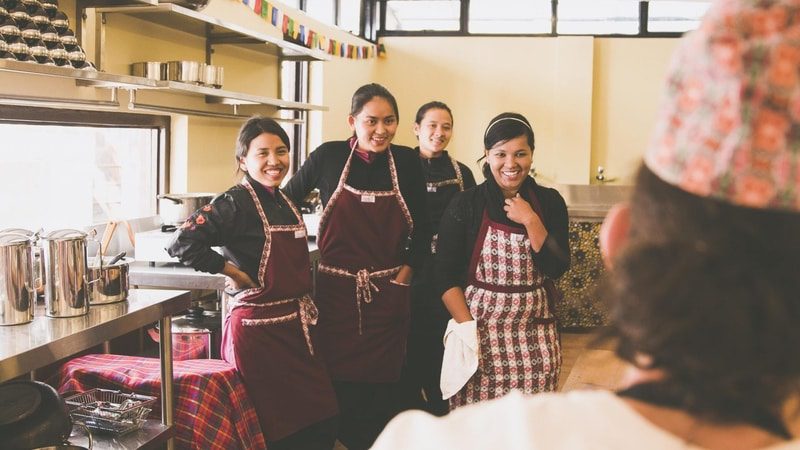
“If these women didn’t have a chance to come here to learn, they’d be doing hard labor,” Amrita explains. “But now, when they leave, they can support themselves … they can do more with their lives.”
A quick tour of the centre reveals a small but well-stocked library, thriving vegetable garden, computer room, craft shop, sewing wing and, of course, the kitchen—where operation ‘simmer down rice pudding’ is currently in action.
“If I didn’t find Seven Women, I would be at home with a baby right now. But I want to do more things before I have a baby, and I want to show the other girls in my village that they can do more things too.”
Bimala, Seven Women
Aside from being a place of learning, Seven Women also offers travellers the chance to cook traditional Nepali dishes with the masters themselves—the women. Visitors can learn about local problems and solutions in real life, and contribute to the financial sustainability and wellbeing of these community projects in a tangible, meaningful way. Today, my masterchef mentors are Bimala and Mina, two scholarship girls in their late teens who have been given the opportunity to study in the city.
Bimala and I make a start on the achar (pickle), one of my favorite local side dishes. Depending where you are in Nepal, the achar that comes served with your daily dal bhat (rice and lentils) could be shockingly spicy, bitter with herbs, or the kind of tangy sweet that lingers on the tongue. Today we’re making achar using tomatoes, with a little extra cumin and mustard seed for flavor.
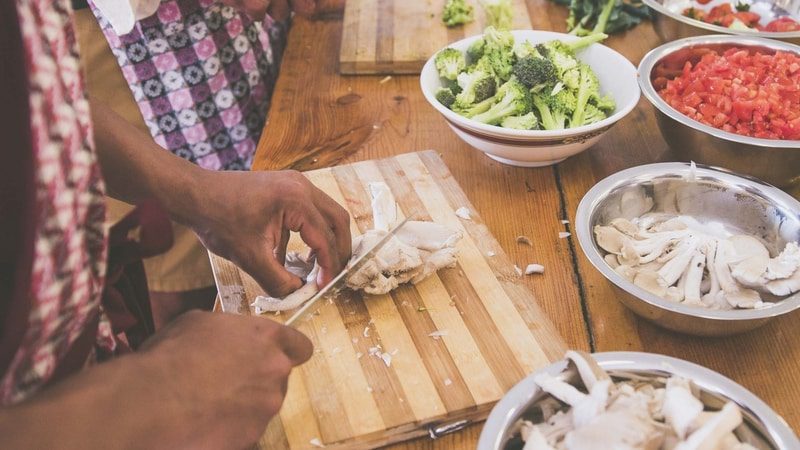
Bimala hands me a knife and, at first, we simply chop garlic in companionable silence. My initial impression of Bimala is one of humble kindness—she seems shy, but has a glint in her eye that suggests a backbone made of steel. It’s when we move on to slicing the ripe tomatoes, the red juice staining our aprons, that Bimala begins to tell me her story.
She’s studying to be a social worker—no small dream for a girl hailing from a village where women either marry early or face being sold to men in India. Her mother died when she was young, leaving Bimala in the care of her brother and father. While the men in her family had no problem with Bimala wanting to study, she was still expected to work and provide a wage, a near-impossible feat when the nearest school was a five-hour return trip.
“Breaking society’s cycle can be very difficult, and it takes a lot of courage. We’re trying to change lots of things right now, but we’re doing it all together.”
Amrita, Seven Women
So, Bimala was faced with a dilemma—either stay and get married, or leave and get educated. “If I didn’t find Seven Women, I would be at home with a baby right now,” she explains. “But I want to do more things before I have a baby, and I want to show the other girls in my village that they can do more things too.”
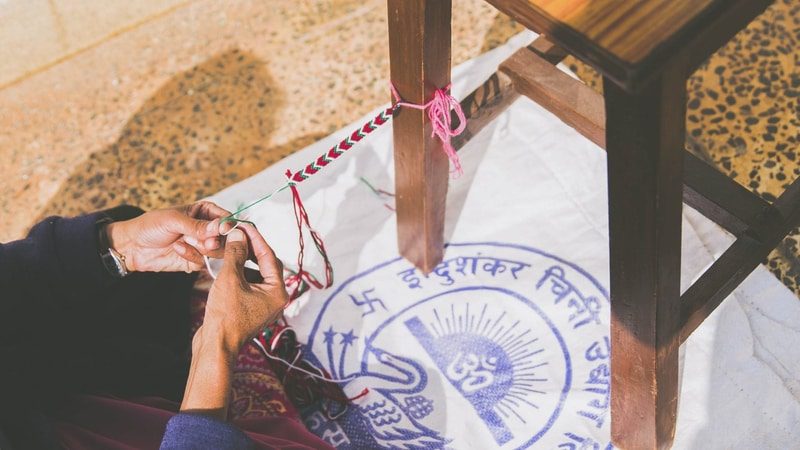
Bimala is a feminist in the truest sense. She speaks passionately about equality in her village and women’s rights across wider Nepal, and she tells me that she wants to be a social worker so that she can change the child marriage custom, one girl at a time.
The more I chop and chat with Bimala, Amreeta and Mina, the more I realize that Bilama’s story is a common Nepali narrative. “Breaking society’s cycle can be very difficult, and it takes a lot of courage,” Amrita shares. “We’re trying to change lots of things right now, but we’re doing it all together.”
By the time the dal bhat is ready, the achar is pickled and the masala tea is boiled, I’ve got goosebumps. These young women are fighting for the rights of the next generation of Nepali women. And the Seven Women centre is giving them the ammunition to confidently do so, one finance, reading, and English lesson at a time. A recipe for a better life? These women are the proof in the rice pudding.
If you’d like to support Seven Women, or learn more about the project, visit The Intrepid Foundation.

